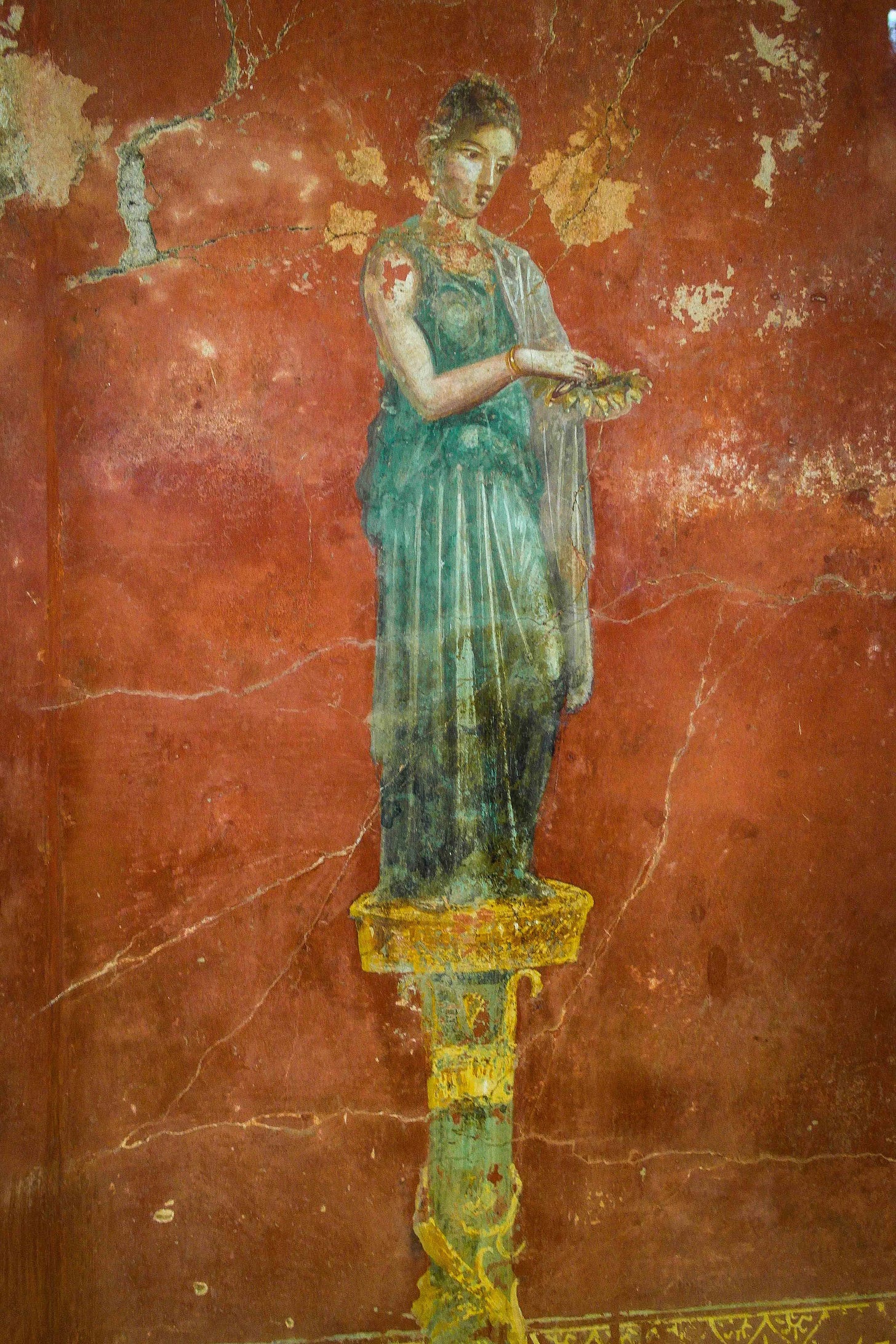In Step 14, we explore how we respond in the face of lies and falsehoods, and why patience and discernment go hand in hand. Then we come into the field of gentleness and how we maintain our patience when those who have other values from ourselves present what sounds like outrageous speculation. We end with a meditation that helps restore the sanctuary of a place in time where the sacred has fled, with the help of our own god or guiding spirit.
§ If someone speaks falsely, withdraw mildly. §
-Verse 24
FINDING FORBEARANCE
This verse should really become a meme! How many times have you been provoked to lash out and pontificate on some erroneous post on social media? I know I have to exercise the most extreme control when reading some posts, not to comment, nor to employ my well-honed irony to a sharper point, because I know well enough that I can wither someone with words. It is a fault, not just of myself, but of many writers who normally use words to educate and support, but whose skill can be also misused to needle and inflame. Also, I have a hard-wired failing of always being right. So this is hard work for me especially.
Forbearance or ‘withdrawing mildly’ is tough. But why should we withdraw? The power of a human being to become reactive is very well known: it arises in that part of our innate competitiveness. Walking away quietly when someone is speaking nonsense rather than refuting them, or when they are telling utterly downright lies, is better than leaping in to create an argument. And there is also another good reason that we might not have consider, as Epictetus tells us,
‘Someone who hangs out regularly with certain people, whether it be for conversation or parties, or just to be sociable, is either going to resemble them or else to convert them to their own way of life. You know if you put a dead coal next to a burning coal, either the dead coal will extinguish the live one, or it will be set alight by the burning coal…… Do you have the skill of a good lyre player who knows from the moment he touches the strings which are out of tune? Or do you have the power that Socrates possessed, the skill of bringing people associated with him over to his view?... Why is it that these people are stronger than you? It’s because all the rotten things they say – chatting about gladiators, horses and athletes, or gossiping about celebrities – how bad they are or how good, in mockery and often ridicule – because these words are drawn from their own judgements.? And judgement is invincible
So, unless you have all your fine thoughts firmly established or acquired the power to protect yourself in safety, I would advise caution. Otherwise, all that your write down in the schoolroom will melt away one day at a time like wax in the sun. You should retire to some place away from the sun as long as your opinions are like wax.’ (ED 3:16, 1-10)
Here Epictetus is reminding us that the notes of students were written down on waxed tablets with a stylus: you just rubbed away your notes when you had made a more permanent record and then you had a clean tablet. Of course, we may also pick up the Icarus reference to hubris and flying higher than others. The hot coal reference reminds us that we too can become easily drawn into dangerous company and take its coloration very quickly if our own views are unformed. This is why Hierocles understands that we need some good cladding before we venture to rebuke someone who is talking out of the back of his head, because we can catch fire ourselves, unless we are an old hand at intervention:
‘The soul that is sufficiently prepared to contend against deviations from the truth will bear false opinions without being perturbed, since the soul’s very apprehension of the truth entails that it has already reflected on all that is contrary to the truth. What then will disturb this person, as if such things were insoluble? What power will imagination have over such a person, who has already defeated all falsehoods? The person of knowledge will therefore be imperturbable as a result, not only on account of ethical virtue, but also from having undergone such conflicts with confidence.’ (GV XII 8-15).
But that is not most of us! Half-digested truths and cleverly concealed lies can still catch us out. This is particularly so when it comes to purveying and seeking for spiritual truth, when we feel we should be on safe, or at least, hallowed ground! I am purposely choosing to look at presumption around spirituality here, because it is one of the topics which Artificial Intelligence cannot work out with any good discernment, as it has no clear conception of what is sacred.
SETTING UP SHOP PRECIPITATELY
We live in a time when the glamour of the spiritual life has reached such proportions that everyone and his wife is setting up shop as a psychic, a teacher, a healer or a sage. Some folk weave fantastic stories about their antecedents and origins that are so laughably ridiculous that these pronouncements are no good advert to them; by creating for themselves a spiritual lineage, pretending to come from a weighty ancestral background – especially when you and I know that their father was actually a plumber, from a long line of plumbers – they merely provoke mockery!
Then there are the two-a-penny healing masters and mistresses who have paid a mint of money for their initiation, and they now mean everyone else to re-imburse them for their outlay, with charges that will make you exclaim. We are all familiar with the paraphernalia that accompanies this area: where the trappings of sacred things – crystals, wands, robes, drums, lamens, and incense – are in fact all that the practitioner in question has to hold them up, because there is certainly little actual content, wisdom, or ability behind it. Those who have not yet worked out their apprenticeship with a teacher are not those from whom we really want to learn. Epictetus’ world was no different to our times, and there were people who had learned a very little and then set up their shop pretty quickly:
‘They who have merely received bare maxims are presently inclined to throw them up, as a sick stomach does its food. Digest it, and then you will not throw it up; otherwise it will be unfit for nourishment. But show us, from what you have digested, some change in your ruling faculty… A carpenter does not come and say, "Hear me lecture on the art of building;" no, he buys a plot, builds a building, and shows from the completed house that he is indeed master of his trade. … Show us first that you can perform the duty of a citizen, that you can bear reproach, or with an unreasonable brother or father; bear with an unruly son, a neighbour, a companion. Show us from these things that you have really learned something from the philosophers. Don’t tell us,"come and listen to my commentaries." For how can you impart things to others than you don’t yourself possess!’. (ED 3:32, 1,4,6,10)
Epictetus is speaking here of our ‘ruling faculty’ or hegemonikon, which is often translated as ‘the guide of the soul’ in Stoic philosophy. It is a word that comes up frequently in the Meditations of Marcus Aurelius, whom we will meet further down in this step, where it is closely connected with the daimon, the soul’s guide.
The Stoics understood the hegemonikon, or ruling faculty, to have four powers: those of imagination, reason, impulse and assent. Imagination provides the sensory or mental reproductions of past phantasies or mental images which we each file for reference. Reason is the faculty of making sense of things, or how we each apply logic to help our understanding. Impulse reacts according to the nature of the files in our imagination, while Assent is the action whereby we approve something, only after we have evaluated the object of desire. This four-way process was how Stoics undertook to view things, to ensure that they were not being led up the garden path, away from the core values by which they led their lives.
I’ve chosen to focus on the false or presumptuous representation of spiritual matters in this step as an example of how we need to use our hegemonikon. The problem with setting up shop untimely is not just that it not only comes over as ridiculous, but it is very rarely attended with any respect or even an observance of the spiritual guardians of that tradition. In our own times, when we are assaulted by the wholesale appropriation of indigenous customs, ceremonies and traditions, by hollow imitations of them performed by people who have no vocation or understanding of them, yes, we can also ‘withdraw mildly’ from those kinds of things, when we feel we are being told something untrue, or when we are being asked to participate in something that is a mere reiteration rather than the real thing.
Those who work from the premise of ‘this spiritual stuff will make me a lot of cash’, are merely snake-oil dealers in spiritual things, and while they are not the same as those who are studying a spiritual tradition who, as yet, have meagre experience, yet neither are presenting the truth of sacredl disciplines well, and it is a challenge to our discernment. If we have well understood what sacred things are, then we will have a good sense of what they are supposed to be like in our imagination; if we use our reason to assess how the simulacra or phoney presentation of spiritual matters fails, we can avoid contact. But if our imaginations have spun, say, a dreamy romantic view of a spiritual discipline, then our impulse will be to replicate its by-products by buying dream-catchers, crystals and what-not, because these things seem to enable us to feel elevated and spiritual. However, our hegemonikon when faced with such paltry things cannot assent to any involvement with these peripherals or any teaching methods that violate our reason. It all starts with how we filed our understanding or phantasia of Spirit in the first place.
The hegemonikon provides us with a process of stripping down our representations or imaginative understandings of things, before we install them complete and entire in our consciousness. Which is just as well, as we are all entering a time when our world will not easily be able to tell between truth and lies, with the faulty spiritual guidance of Artificial Intelligence, which is great at discerning the details of an x-ray but rubbish at telling us much about spiritual consciousness or states of soul. But these are not the worst that may befall us.
So, while we may use our ruling faculty to discern the easy charlatans and presumptious students of a tradition, what about those who look and sound like the real thing, or who come with some signs of authenticity, just as Rasputin did? He behaved to his followers as a holy staretz or holy man, blessing and praying with the afflicted, but in private, he behaved in a drunken and debauched way. His influence over the Tsar Nicholas’s family was far-reaching, to their great detriment. With such people, we have to turn to our ruling faculty and remember Marcus Aurelius and hear him say to us: ‘Things cannot touch the soul. They have no access to the soul. They cannot produce our judgements, being outside of us. They themselves know nothing, and by themselves they affirm nothing.’ (Marcus Aurelius Meditations. IV 3,10; V,19; VI, 52; IX, 15)
His advice continues, ‘Let the part of your soul which leads and governs be undisturbed by the movements in the flesh, whether of pleasure or of pain. And do not allow it to unite with them but rather but let it circumscribe itself and limit those affects to their parts, but when these affects rise up to the mind by virtue of that other sympathy that exists in the body which is all one, then you must not strive to resist the sensation, it is natural. But do not allow your ruling part of itself add to the sensation the opinion that it is either good or bad. ‘(Marcus Aurelius Meditations, 5,26.)
Against so many assailing lies and persuasions, what will bring us into the fields of gentleness?
THE ART OF GENTLENESS
We have mentioned Marcus Aurelius (121-180 CE) here a few times. This Stoic Roman emperor lived a life at court and in the army, but he followed a simple and generous-spirited life-style, keeping a diary of his of his own struggles and observations which became collected into the book we now know as his Meditations. But these notes were largely written to encourage himself, becoming a place to work out and remind himself of the principles by which he hoped to live and die, amidst the vast administrative nightmare of government and the long campaigns that he fought. It is particularly poignant that a man who served as emperor but who wished to live as a simple philosopher, drew his inspiration from Epictetus, the Stoic slave who had became a freeman whose lectures were so popular.
These sayings of Epictetus brought the emperor peace, and help him to maintain a humane and temperate attitude to other people and both their errors and their blandishments:
‘With regard to those whose principles of life are different from himself he will be patient, gentle, delicate, and forgiving, as he would towards someone in a state of ignorance, someone who missed the mark when it came to the most important things. He will not be harsh to anyone, for he will have perfectly understood Plato’s word: “Every soul is deprived of the truth against its will.”’ (ED II, 22, 36)
The ‘mildness’ in the verse of this step is leading us to rediscover the art of gentleness, which involves letting people down lightly, but not letting them off, unless we have the skilled discernment to follow the path of correcting the lie.
We know that children have to be taught how to discern truth from lies, and we are patient with their own home-grown stories which help explain how life works, which we understand will one day mature into better knowledge, and a true discernment, if they are well-guided. However, fantasy and speculation often have a longer life and some of those children will grow up, still believing in all kinds of speculative and untrue things on which they depend as adults. For example, there is a certain hairdresser I can no longer visit because all that comes out of her mouth while she works are views about aliens and wild conspiracy theories which utterly captivate her. I once tried to reason with her about these, but soon learned that ‘withdrawing mildly’ was all I could do, as she was firm in believing in these bizarre signs and wonders.
As Marcus Aurelius remarks many times: ‘If someone is wrong, instruct that person with benevolence, and show them what they have overlooked. But if you don’t succeed then (you can) feel blameful or not blameful.’ (Marcus, Meds X, 4) Or even
‘Try to persuade them, but act even against their will, when that is required by the rational order of justice.’ (Marcus Meds. VI, 50,1)
But if none of this is working then, to always remember, as Hierocles writes, ‘hear with compassion and indulgence the ones who advance false opinions, and from this experience observe the evils we have delivered ourselves from. For though we are of the same nature with those deluded wretches, and consequently subject to the same passions and weaknesses, we have nevertheless taken philosophic knowledge as an antidote which has healed the infimity we now witness in them. (GV XII,8)
Marcus insists that a genuine human being has to ‘avoid lecturing people and being frustrated at them, for both are unsocial and lead to harm. For it is not anger that is manly, but rather gentleness and delicacy. It is because they are more human that they are more manly; they possess more strength, more nerve, and more virility, and this is precisely what is lacking in the person who gets angry and loses their temper, (Marcus XI 18,21)
The fallibility of people and our ability to fall into all manner of warped opinions is forever playing out among us everywhere we go. Marcus taught himself the art of gentleness in this way, ‘Imagine that (such people) are akin to you, that they act out of ignorance and against their own will.’ (ibid VII, 22,2) And because, ‘I cannot be angry with one who is related to me, nor hate them, for we were made to cooperate,” ’(ibid II, 1,5) he could not maintain any anger or despite against them.
The ultimate realization is that ‘we are all working together to one end, some with knowledge and design, and others without knowing that they do. Even as Heraclitus said, of those when they are asleep, that they are labourers and co-operators in the things that take place in the universe…For the universe has need even of such people as these. (Ibid VI, 42)
This is what will lead us into the field of gentleness.
§ Consider §
· What is it that can have you frothing at the mouth the minute you see or hear it?
· Take one of your own beliefs about a topic for a walk with the help of your hegemonikon or ‘ruling faculty.’ (You could use the last consideration in this section to work with.) Using its four powers of imagination, reason, impulse and assent, ask the following questions.
1. What mental image do I have for this? Is it a true understanding, or does something else accompany it, like a memory, trauma, or false association?
2. How do I understand it? Does it make sense?
3. How do I react to the conceptualization I am holding of this? Does it come with attraction, repulsion, or what?
4. How do I evaluate this topic? Is it something I can assent to and file as reliable and true?
5. How does this topic stand within my inner citadel, or is it something that I do not need? What needs to be separated or set aside from it?
· What constitutes the sacred in your understanding? What do you expect implicitly to be present at sacred actions, rituals, places, and teachings?
MEDITATION
In this hard-hitting exposé, Epictetus engages with the person who wants to set up his own Eleusinian cult. We note that the rites of Eleusis, which underpin the sowing and reaping of grain in the autumn and spring, were the most famous and respected of the Mystery traditions in Greece, and that they were attended by people of all kinds, while the rites were administered by the Hierophant and temple staff who ensured the orderly unfolding of the Mysteries, as well as the respectful behaviour of the neophytes seeking initiation. But the wholesale copying of these things is not the same as ‘the words said, the things done’ at these rites. Replicating them elsewhere is not the same as partaking of them in the place where these sacred actions originally happened.
‘"But so-and so has a school, so why should not I have one?" Foolish being!’, these things are not brought about carelessly and at random; you have to be of an appropriate age, and a certain way of life, and have guiding god. Is it not so? No one embarks from a harbour until they have sacrificed to the gods, and prayed for their assistance; nor do people sow grain without first invoking Demeter. And should anyone begin so great a work as this without the gods? And what of those who apply to such a person, will they meet with success?
What are you doing else, sir, but profaning the Mysteries? As if you said, "There is a temple at Eleusis and now here is one here too; there is a priest, and I will make a priest here; there is a herald, and I will appoint a herald too; there is a torch-bearer, and I will have a torch-bearer; there are torches, and so shall there be some here. The words said, the things done, are the same. Where is the difference between that Eleusis and my one here?” Impious fellow! is there no difference? Do these actions bring the same benefit if they’re performed out of their place and time? A person should come with sacrifices and prayers, previously purified, and their mind predisposed to the thought that they are approaching the sacred and ancient rites.
Is this the way the Mysteries benefitted us; is this the way that all these things were appointed by the ancients for the instruction and correction of our life? But you divulge and publish them without regard to time and place, without sacrifices, without purity; you don’t have the robe that the hierophant wears, nor the right hair nor fillet. You don’t have the voice, nor the age, nor have you been purified yourself like him. But when you have got the words by heart, you say, "The mere words are sacred of themselves." I tell you, these things are to be approached in another manner. It is a solemn, mystical affair; not lightly granted to every random person. … Above all, you need a particular vocation from God to undertake this office.’ (ED 3:21,10-18)
RESTORING THE SANCTUARY - A RITUAL MEDITATION
This ritual meditation is one that can be done for anywhere on earth, or in any time, as its reach doesn’t remain just in our own time and place. Throughout, be led by your guiding faculty or by the god or spirit that you know best.
Light a candle and invite the sacredness of the divine to be present. Be aware of the light of your candle growing tall and wide, becoming a gateway that leads through to a place from which the sacred has fled, asking, ‘Please show me where your remembering is most needed and help me bring healing.’ When you are ready, step through the door of light into a place or time in the world where wisdom has been scattered. You come before a sacred icon, statue, or emblem from which the wisdom and help have fled. Be aware of what this feels like first of all.
Now, call upon what is holy to you – which may be a god or spirit that has shown itself to you in ways that you understand and have experienced. Ask it to reach through you as pure divinity to help reinspirit that image, symbol or statue to radiant life. In this place also is one who remembers something of the sacred rites of this place and time. Unknown to this person, sit beside them. Whether they are reading from sacred scriptures, or remembering the sacred story of their mystery, or whether they are praying with all their heart, allow your god or spirit to reach through you to speak a word or utter a sound, which you whisper or sing to this person who is faithful to the sacred. Allow this word or sound to reinspirit the sacred rites that all hearers may be gladdened.
Thank your god or spirit for working through you. Now bow to the spirit of the sacred which has been seeded here and begins to grow in its own time and place, while you return through the door of light, into the place where you now sit.












I echo Toni - this is really great, thanks so much Caitlin 🙏
This is wonderful, and much-needed at the moment. Thank you!